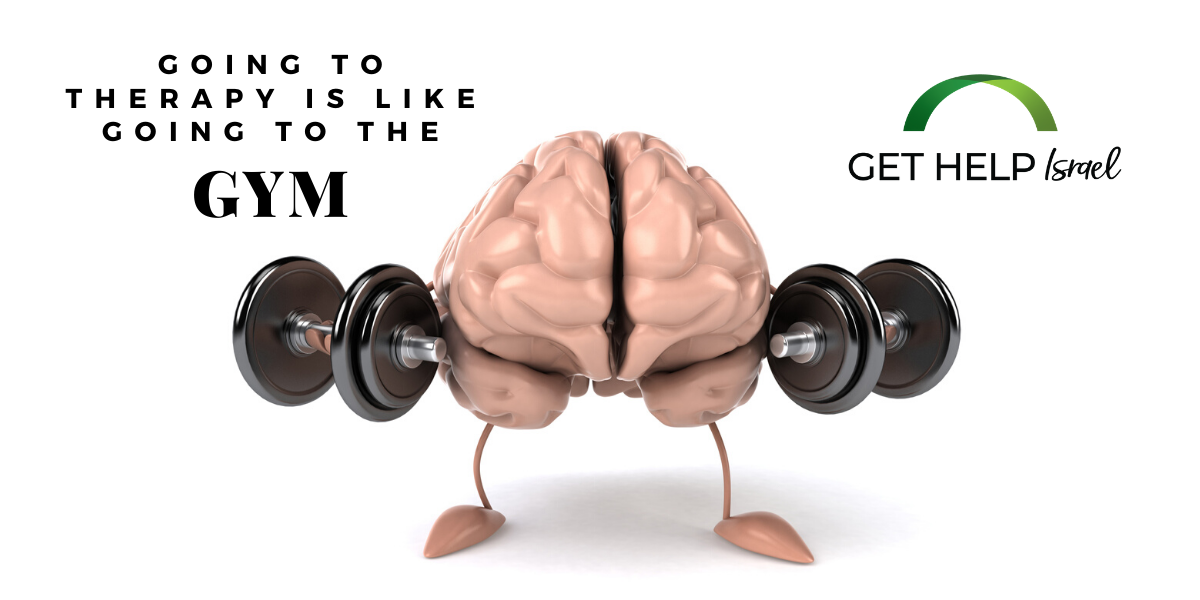Lets Talk About Therapy The Same Way We Talk About Going To the Gym

Imagine how much easier life would be if therapy was seen simply as a form of going to the gym: Stretching – Stretching our mind and perceptions, overcoming self-made limitations, increasing our physical well being which has direct impact to our emotions, after all mind and body are intertwined.
A gym bag could be seen simply as an emotional tool kit. Each new skill can be likened to a new stretching position, at first you may feel unbalanced then after building stamina and strength the routine or process becomes easier. After the workout you might feel some muscle tightness, soreness and tension in areas that you are not used to stretching. Eventually those same muscles will loosen, and begin to change shape, building strength, flexibility and improved balance creating emotional resilience.
Compared to years ago therapy is now seen as something with far less stigma attached to it, however many people still carry fear and shame attached to seeing a therapist. I was surprised in 2019 how many people actually still feel uncomfortable with considering therapy.
A person’s core cultural beliefs, geographical, age and familial factors affect willingness to consider going to therapy. Also, gender tends to play a barrier to the idea of initiating therapy and exploring personal growth. Women tend to be more willing, relaxed and open to the idea of therapy while men are more apprehensive and are burdened with myths about what it means to be a man: ‘men should be able to resolve their problems without seeking outside help.’
Here are some of the expressions and beliefs that I have heard over the years: now that I need therapy I feel it’s the end of the line, a kind of mental brainwashing, and head shrinking, aerie fairy stuff, I must be crazy, am I mentally ill, I should be able to handle this myself, what does this say about me?
People that have not experienced therapy before often wonder ‘What really happens in that room? What do you do? Will I still be myself when I leave? What if I start crying and I can’t stop? If I go to a therapist, does that mean I’m crazy, weak or a failure? What will others think? What if I’m seen coming out of that kind of office?
Such concerns are quite natural given our socio-cultural conditioning. Unfortunately, as a result, many people decide not to pursue counseling despite experiencing significant emotional, physical or mental distress.
We are influenced by personal experiences and what friends and family say. These social scripts reflect the cultural beliefs but are not necessarily to the benefit of our well-being about what we think therapy is. For example, a person may worry about being regarded by others as unstable, weak, or having serious problems. Individuals may rest their opinion of therapy on a very small amount of data, such as the treatment success (or lack thereof) of just one family member.
Before therapy can begin, it is necessary to understand how a client perceives this process. Otherwise this stigma can be a barrier toward the first steps of initiating and exploring.
One of the first questions I ask a client is: How is it to be here today? What does it mean to come for therapy? Is this a new experience? And if it is a new experience what story do you have about therapy? If not, what was your experience going to therapy before
There are many reasons why a person decides to go for counseling. There are many challenges we can anticipate in life, some small stressors and bumps in the road, others are more difficult life cycle transition issues affecting our ability to cope, and some crisis, unanticipated that feel so deep we don’t know where to start. Its okay to seek support before there is a crisis. It’s okay to reach out for support to seek validation and clarity. Its okay to say ‘I am not sure why I am here, how these sessions can help me, but I feel I need support. It’s too hard to go it alone.’ The truth is we don’t have to suffer alone…we don’t have to walk through uncertainty by ourselves.
So, if you are going through one or more challenges at the same time, you’re not alone. The effects are often cumulative, which is generally referred to as a ‘pile-up’ of stressors. Counseling during these times can be quite helpful in providing both the support and skills to better address these life challenges. Ultimately, it is an invaluable investment in your emotional, physical and mental health, an act of courage not weakness, a gift to those whose lives you touch, and the ultimate gift to yourself. After-all, this is your life and there is nothing more precious than that.



